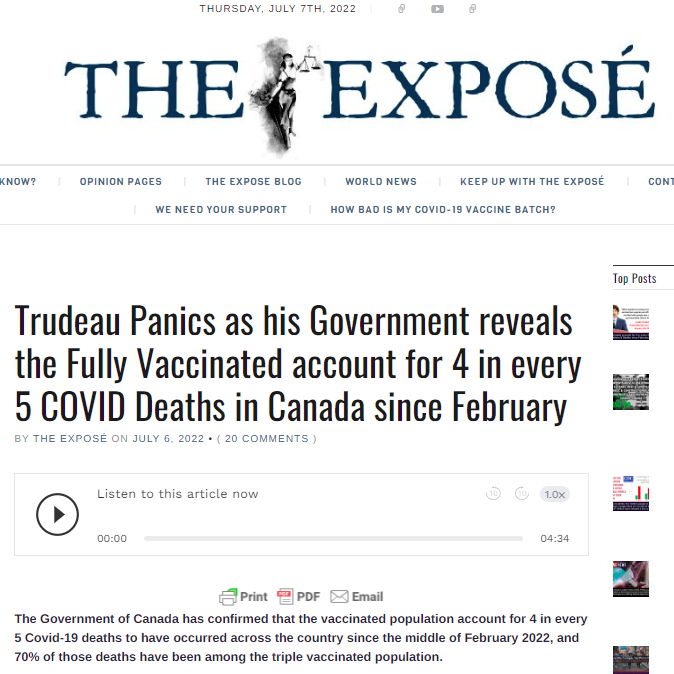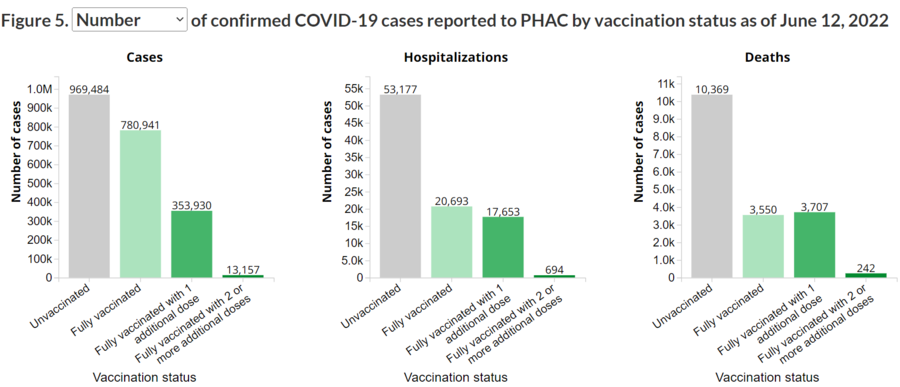
Is Canada's Prime Minister panicking over statistics that show 80 percent of Canadians who died of COVID were vaccinated? No, that's not true: That percentage isn't a surprise in light of widespread vaccination, which makes a relatively small actual number of deaths into a large percentage of overall deaths. The claim offers no proof of panic. In fact, at the time the claim was made, Trudeau had tested positive for COVID and said he expected little impact because he had been vaccinated. Because the majority of Canadians are vaccinated, especially the elderly and those with underlying health problems, it makes sense that fatal breakthrough infections of the many vaccinated outnumber fatal infections among the unvaccinated few. Like the rest of the world, Canadians who are vaccinated are far less likely to die of COVID than those who are vaccinated.
The Public Health Agency of Canada told Lead Stories, "Most people in Canada have been vaccinated. Because they're a larger group, there will naturally be more cases among vaccinated people than among unvaccinated people. However, despite their higher case counts, vaccinated people are less likely to get very sick or die."
The claims appeared in an article (archived here) published by The Exposé on July 6, 2022, under the title "Trudeau Panics as his Government reveals the Fully Vaccinated account for 4 in every 5 COVID Deaths in Canada since February." It opened:
The Government of Canada has confirmed that the vaccinated population account for 4 in every 5 Covid-19 deaths to have occurred across the country since the middle of February 2022, and 70% of those deaths have been among the triple vaccinated population.
This is what the post looked like on The Exposé website at the time of writing:
(Source: The Exposé screenshot taken on Thu Jul 7 03:17:21 2022 UTC)
The figures in The Exposé article are largely accurate but aren't presented in context. In a July 7, 2022, email to Lead Stories, the Public Health Agency of Canada (PHAC) said:
While COVID-19 vaccines are highly effective at preventing severe outcomes such as hospitalization and death, vaccinated people can still get infected if exposed. This means that even with high vaccine effectiveness, some vaccinated people will get sick, be hospitalized or die.
Most people in Canada have been vaccinated. Because they're a larger group, there will naturally be more cases among vaccinated people than among unvaccinated people. However, despite their higher case counts, vaccinated people are less likely to get very sick or die [their emphasis].
As of June 19, 2022, 81.86 percent of the population of Canada was fully vaccinated, with 86.3 million doses administered, according to the Government of Canada's COVID-19 vaccination website. That compares to 66.8 percent of the total U.S. population being fully vaccinated through June 22, 2022, according to the Centers for Disease Control and Prevention (CDC).
Approved COVID-19 vaccines in Canada are available for people 5 years of age and older.
The PHAC's email also said the benefits of vaccination are clear:
Fully vaccinated people diagnosed with COVID-19 were significantly less likely to be hospitalized or to die, particularly if they received an additional dose(s).
Between May 09, 2022 and June 05, 2022, unvaccinated cases were 4 times more likely to be hospitalized and 5 times more likely to die from their illness, compared to fully vaccinated cases. During the same 4-week period, unvaccinated cases were 4 times more likely to be hospitalized and 6 times more likely to die from their illness, compared to cases fully vaccinated with 1 or more additional doses.
And since the start of its vaccination campaign on December 14, 2020, the Government of Canada's COVID-19 epidemiology update shows how COVID vaccines have successfully reduced severe illness requiring hospitalization and deaths, even with the advent of new variants:
(Source: Government of Canada's COVID-19 epidemiology update screenshot taken on Thu Jul 07 17:16:46 2022 UTC)



















